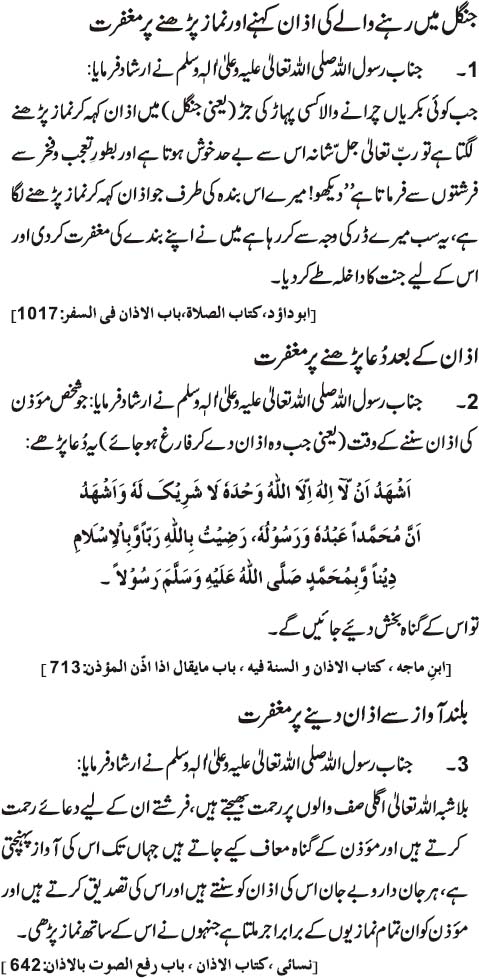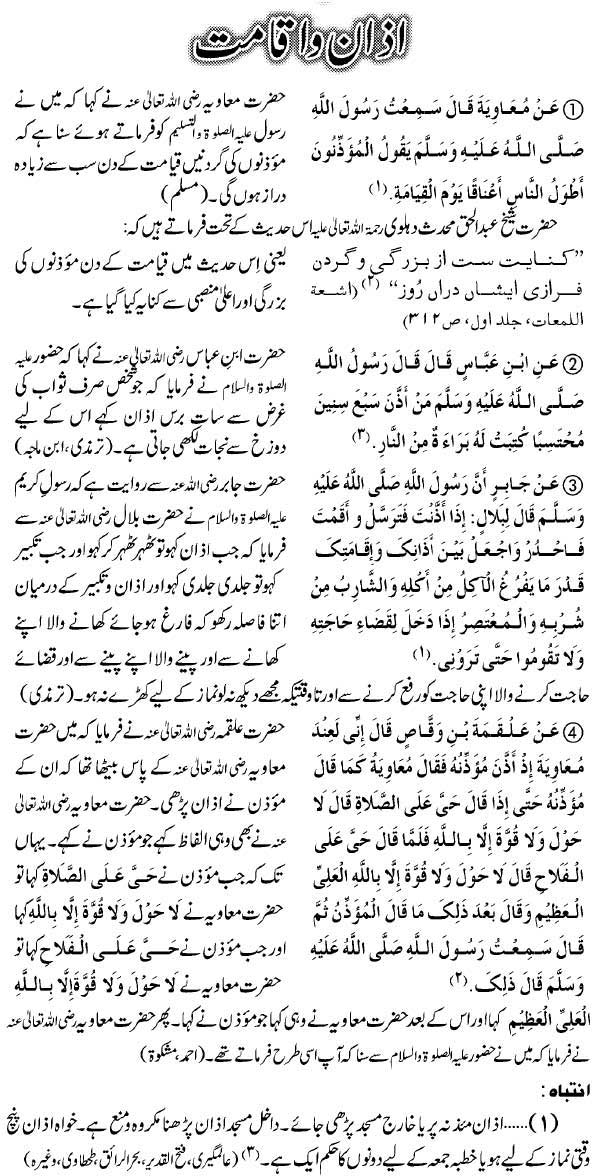
Azan Kehne Aur Azan Kay Baad Dua Parhne Par Maghfirat
TAG: Moazan
Azan Ki Sunnatien

Azan Ki Sunnatien
Ahad Ahad: Bilal Radhiyallaho `Anhu
Bilal (Radhiyallaho Anhu) is one of the Best known of the galaxy of ‘Sahabah’ as ‘Moazzin’ of the Prophet (Sallallaho `alaihe wasallam) ‘Masjid’. He was an Abyssinian slave of a disbeliever in Mecca. His conversion to Islam was, naturally, not liked by his master and he was, therefore, persecuted mercilessly.
Ummayah bin Khalaf, who was the worst enemy of Islam, would make him lie down on the burning sand at midday and would place a heavy stone on his breast so that he could not even move a limb…! he would then say to him…
‘Renounce Islam or swelter and die.’
Even under these afflictions, Bilal (Radhiyallaho Anhu) would exclaim…
‘Ahad’ The One Allah! ‘Ahad’ The One Allah!
He was whipped at night and with the cuts thus received, made to lie on the burning ground during the day to make him either forsake Islam or die a lingering death from wounds. The torturers would get tired and take turns… Abu Jahl, Umayyah, and others would vie with one another in afflicting more and more painful punishments …but Bilal (Radhiyallaho Anhu) would not yield. Subhan Allah!
At last Abu Bakr (Radhiyallaho Anhu) bought Bilal’s (R.A.) freedom, and he became a free Muslim…! As Islam taught implicitly the oneness of the Almighty Creator, while the idolaters of Mecca believed in many gods and goddesses with minor godlings, therefore Bilal (Radhiyallaho Anhu) repeated…
‘Ahad (The One), Ahad (The One).’
This shows his love and devotion to Allah. Allah was so dear to him that no amount of persecution could distract him from reciting His Holy name. It is said that the urchins of Mecca would drag him in the streets, with his words ‘Ahad’ ‘Ahad ‘ ringing in their wake.
Look how Allah rewarded his steadfastness…! He was to have the honor of becoming the Prophet (Peace be upon him) Moazzin. He was always to remain with him at home and abroad to call out the Azaan for his ‘Salaat’.
After the Prophet’s (peace be upon him) death it became very hard for him to continue his stay in Madinah where he would miss him at every step and in every corner…He, therefore, left Madinah and decided to pass the rest of his life striving in the path of Allah. Once he beheld the Prophet (Sallallaho `Alaihe Wasallam) in his dream saying to him…
‘O, Bilal! How is it that you never visit me?’
No sooner did he get up than he set out for ‘Madinah’. upon reaching there, Hasan and Husain (Radhiyallaho anhuma) The Prophet’s (Sallallaho `Alaihe Wasallam) grandsons requested him to call out the ‘Azaan’.
he could not refuse them, for they were very dear to him. But as soon as the ‘Azaan’ was called, the people of Madinah cried openly out of their anguish at the memory of the happy old days of the Prophet (Sallallaho `alaihe wasallam) time. Even the women came out of their houses weeping. Bilal (Radhiyallaho Anhu) left Madinah again after a few days and died in Damascus in 20 A..H.
Notes:
The great devotee and Muazzin of PROPHET( SALLALLAHO `Alaihe Wa Sallam) the courageous and beloved Abyssinian by the name of Bilal Habshi (Radhiyallaho Anhu) passed away in the middle of reading ‘Azaan’ in Damascus, Syria between the years 638 and 642 (AD). This was the second time after the death of PROPHET( SALLALLAHO `ALAIHE WASALLAM) that BILAL( Radhiyallaho Anhu) recited the Azaan.
Azan And Iqaamah (Call To Prayer)
To give the Azaan for Salah is proven from the Holy Quran-e-Majeed. Almighty Allah says in the Glorious Quran: “And when you call the Azan for Salah”.
The Ulema have stated that to give Azaan for the five daily Salaah including Jummah Salah, is Sunnat-e-Mu’akadah and if the Azaan is not given by anyone, then the people of the entire area are sinners individually. With the exception of the Fardh Namaaz, there is no Azaan for the two Eids, Witr, Janazah Salaah, or any Nafil Salaah. The time for Azaan is the same time as that of Namaz. It is not permissible to give any Azan before the time of that particular Salah.
One who gives the Azan must be a Sunni Sahihul Aqeedah person who is in his proper sense of mind. If Azan is given without Wudhu, it will be complete, but it is not correct to do so. It is not permissible for a person who is in an impure state, an insane person, an intoxicated person, or a Faasiq (open sinner) to call out the Azan. It is Makrooh-e-Tahreemi for women to give the Azaan or Iqaamah. Azan must be given standing facing the direction of the Qibla, with the index fingers in the ears. The Azan must be called out with a loud voice, pausing after each Takbeer. The Azan must be given outside the actual Musjid and not inside as this is Khilaaf-e-Sunnah (against the Sunnah) and Makrooh. This law even applies to the Azaan of the Jummah Khutba. Azan should not be given in front of the Mimbar, but outside the main Musjid, but standing in line with the Khateeb.
To reply to the words of Azan is Mustahab. When the Mu’azzin says, “Hayya Alas Salaah” and “Hayya Alal Falah”, then you should say, “Laa Howla Wa laa Quw’wata illa Billahil Aliyul Azeem”. In the Azaan of Fajr, when the Mu’azzin says, “As Salaatu Khairum minan Naum”, then you should say, “Sadaqtu Wa Barartu”.
It is not allowed to give an answer to the Azan during the Khutba of Jummah. It is important to remain silent and listen to the Khutba. When Azan is read, all talking should stop. Even if a person is reciting the Quran, he should stop and answer the Azan. Even when walking on the street, one should stop and give answer to the Azan when it is heard. If in your area, you are able to hear the Azan of various Masaajid, then you should answer the first Azaan that you hear. In one Hadith, The Holy Prophet (sallal laahu alaihi wasallam) stated: “Freedom from the fire of Hell is written for that Muslim who calls out the Azaan for seven years.”
Benefit In The Answer To Azan:
Once while speaking to a group of women Huzoor-e-Anwar (sallal laahu alaihi wasallam) said: “When Hazrat Bilal (radi Allahu anhu) calls out the Azan and Takbeer, then say as he says, since for every Kalma (word) Almighty Allah will bless you with one hundred thousand good deeds, He will exalt your status by one thousand folds and He will forgive your one thousand sins”. The women then asked, “And what is (the reward) for the menfolk ?” The Prophet (sallal laahu alaihi wasallam) replied, “Double that amount.”
Let us take some time to ponder on this fact, in the Azan of one day, there are seventy-seven words, and in the Iqaamah of one day, there are 85 words. If the Sawaab for the women was so great then imagine it being doubled for the men. Then think that this is for one day, what is the Sawaab of that person whose daily practice this is. Subhan-Allah!
Dua After The Azan:
“O Lord of this beautiful Azan and the Salah which will follow, give our Master Muhammad (sallal laahu alaihi wasallam’s) Wasila and greatness and a very high station. And let him reach the Plain of Mahmood of which You have promised him and let us receive his Intercession on the Day of Qiyamah. Without doubt, You never go against Your Promise.”
Other Instances Where Azan Can Be Given:
With the exception of Namaaz, it is also Mustahab (desirable) to give Azan in the following instances:-
- To give Azan at times of fear brings tranquillity.
- During an uncontrollable fire. Insha-Allah, the fire will be quickly extinguished.
- Azan can be given in the ears of a person to remove fear and sadness.
- At the birth of a child, Azan should be given in the right ear and Iqaamah in the left ear.
- Azan can be given at the grave-side to give Sukoon (tranquillity) to the deceased.
- Say Azan to cure somebody who is affected by Jinnaat or Shaitaan.
- During the time of the storm.
- To ask for rain during drought, or to stop a heavy storm.
- When lost in a forest, by saying Azan, someone will show you your way.
- Saying Azaan in your business or residence will increase Barakah (blessings).
Iqamah(Takbeer)
The Takbeer or Iqaamah that is called out after the Azaan and before the Jamaah is also like Azan except for a few differences in Azaan and Iqaamah:-
- Iqaamah is given inside the Musjid and Azaan is given outside the Musjid.
- Takbeer is given softly and Azan is given loudly.
- During Takbeer, the fingers are not placed in the ears.
- Takbeer is read rapidly.
- Takbeer for Fajr does not have the words “As Salaatu Khairum minan Naum”.
- In Takbeer, “Hayya alal falaah” is followed by “Qad Qaamatis Salaah”.
- In answer to “Qad Qaamatis Salaah” at least say: “Aqaamuhallahu Wa Adamahaa”
- Takbeer must be said by the Mu’azzin and through his permission, someone else will be allowed.
- To stand during Takbeer is Khilaaf-e-Sunnah. The Imam and Muqtadi should sit during Iqaamah and only stand when the Mu’azzin says “Hayya Alas Salaah” – “Haya Alal Falaah”.
Hazrat Bilal Habshi

Azan Aur Iqamat

Azan Kay Fazail


